Relationship AI: How AI Can Help You Become a Better Partner
Enhance your relationship with AI companionship tools. Discover how relationship AI can improve your partnership on our blog.

The rapid integration of artificial intelligence into various aspects of life, particularly relationships, has led to the rise of relationship AI. This emerging tool enhances romantic and personal connections by helping individuals navigate complex emotional landscapes. Human relationships require consistent emotional intelligence, communication, and effort. Many couples struggle with maintaining balance due to daily stressors, leading to miscommunication and emotional distance. An AI companion offers practical solutions to strengthen bonds and improve communication.
At Kindroid, we push the boundaries of AI companion technology. Unlike traditional chatbots, our AI creates realistic avatars with consistent appearances and voices. These AI bots engage in deep, meaningful human interactions, learning through a robust memory system. We offer extensive customization options, allowing users to tailor the AI's personality and voice to suit their preferences. This creates a safe space for emotional expression and mental health support, ensuring users receive an authentic and responsive experience.
Drawing from our experience with AI companion app development, this blog explores how relationship AI helps improve communication, provides emotional support and fosters growth in romantic relationships. Afterward, you'll better understand how AI can enhance human connections, reduce social isolation, and offer a valuable alternative to traditional human friends.
Let's start!
Understanding Relationship AI and Its Role in Modern Relationships
Relationship AI is transforming how couples navigate their romantic and personal connections. This technology offers real-time guidance, improves emotional intelligence, and enhances communication. AI’s growing presence plays a vital role in strengthening human relationships and providing support for couples' challenges in maintaining balance and emotional closeness.
What Is Relationship AI Technology
Relationship AI technology is an advanced tool that helps individuals and couples enhance their relationships. This technology uses AI-powered solutions like AI chatbots, companion bots, and conversational models to offer insights and guidance. Relationship AI tools analyze conversations, emotional cues, and communication patterns to improve how people interact with their partners.
Role of AI Technology in Modern Relationships
Relationship AI technology becomes essential for navigating the complexities of human interaction. Below are five ways relationship AI is transforming modern relationships:
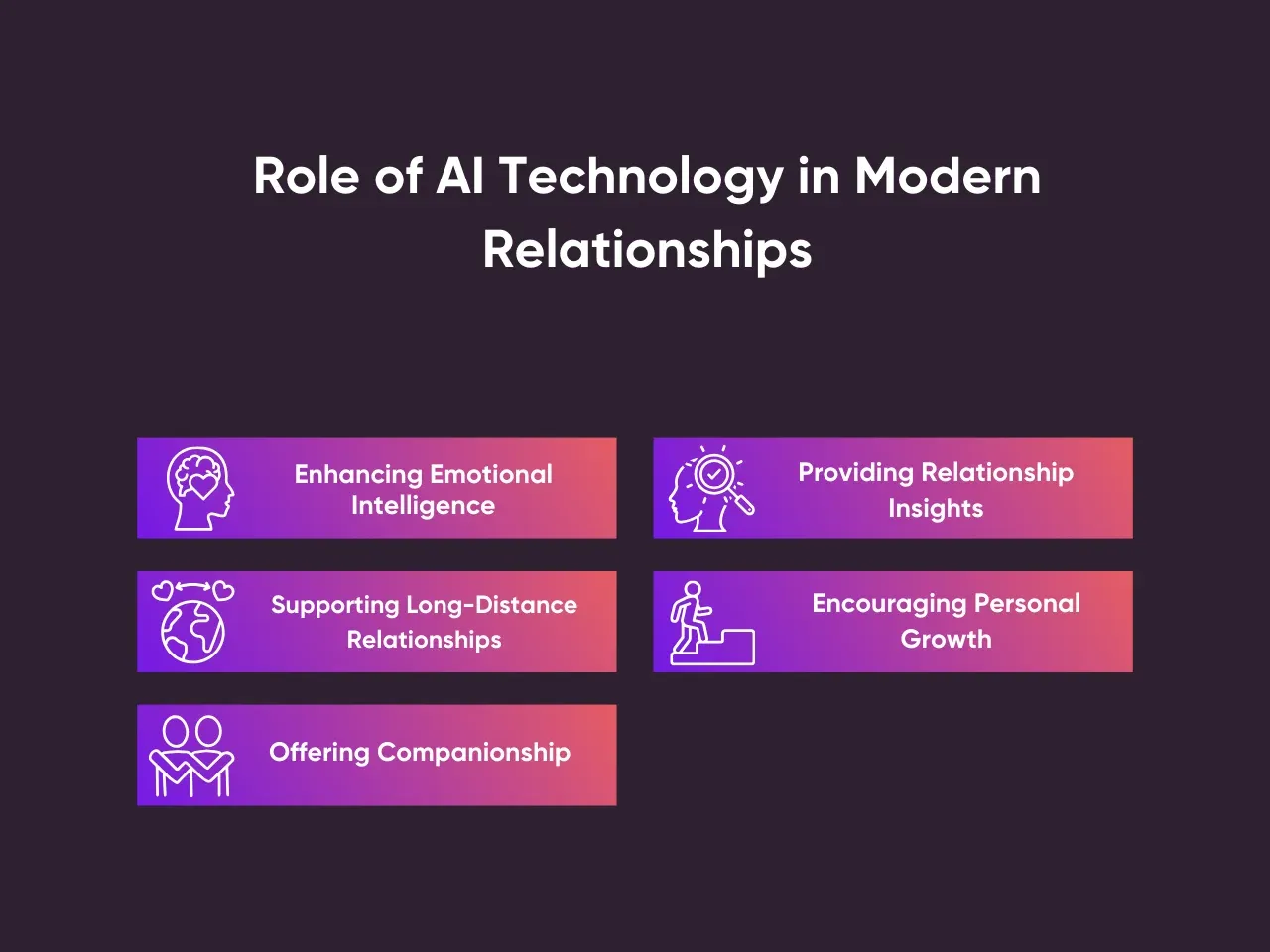
- Enhancing Emotional Intelligence: AI chatbots and tools help individuals better understand their partners' emotions. These tools offer feedback on emotional cues through chat analysis, helping people improve their emotional intelligence. This support fosters deeper connections and reduces misunderstandings.
- Supporting Long-Distance Relationships: Many couples rely on voice calls and Internet communication in long-distance relationships. Relationship AI offers real-time suggestions during conversations, making communication more meaningful. AI tools can help bridge emotional gaps by offering conversation starters and ideas for staying connected despite physical distance.
- Offering Companionship: Companion bots like Kindroid provide emotional support for individuals experiencing loneliness. These bots act as virtual companions, offering consistent conversations to help users feel connected. This companionship can prevent isolation, especially for those struggling to maintain real-life social relationships.
- Providing Relationship Insights: Relationship AI tools analyze communication patterns and provide personalized insights. They can help couples identify areas where their relationship might need improvement, such as reminders to schedule quality time together or address unresolved conflicts.
- Encouraging Personal Growth: Relationship AI platforms often integrate with tools that promote personal growth. For example, listening to relationship podcasts or reading relevant articles can be suggested as part of daily activities. Some AI platforms also integrate with mods and external resources, providing users with access to professional help when needed.
In modern relationships, relationship AI technology serves as a critical tool for emotional support, communication enhancement, and personal growth. With AI becoming more ingrained in our lives, couples can rely on relationship AI to foster stronger emotional bonds through voice calls, chat, or more profound insights into their interactions.
Enhancing Emotional Intelligence Through AI
Relationship AI offers powerful tools to help partners improve emotional intelligence, fostering more empathetic and understanding relationships. Emotional intelligence plays a vital role in healthy communication and deep emotional connections. AI tools can assist partners in recognizing, tracking, and responding to emotional cues, ensuring a more emotionally supportive relationship.
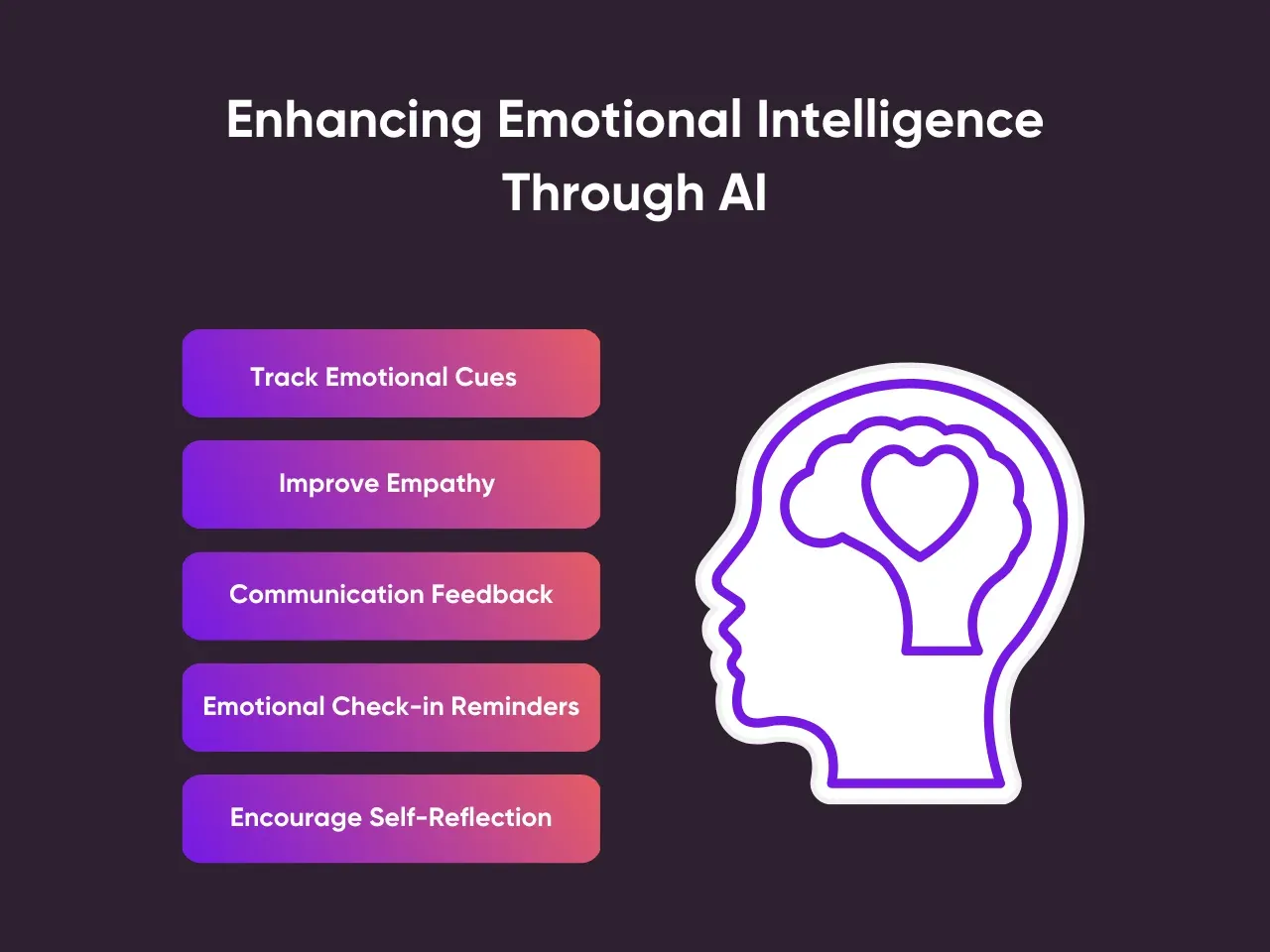
1. Track Emotional Cues
Emotional intelligence plays a key role in communication and decision-making. Tracking emotional cues can help people better understand their own and others' emotions. This awareness leads to improved relationships and effective conflict resolution. Using AI tools to monitor emotions helps develop emotional awareness and self-regulation.
Here are the top five ways AI enhances emotional intelligence:
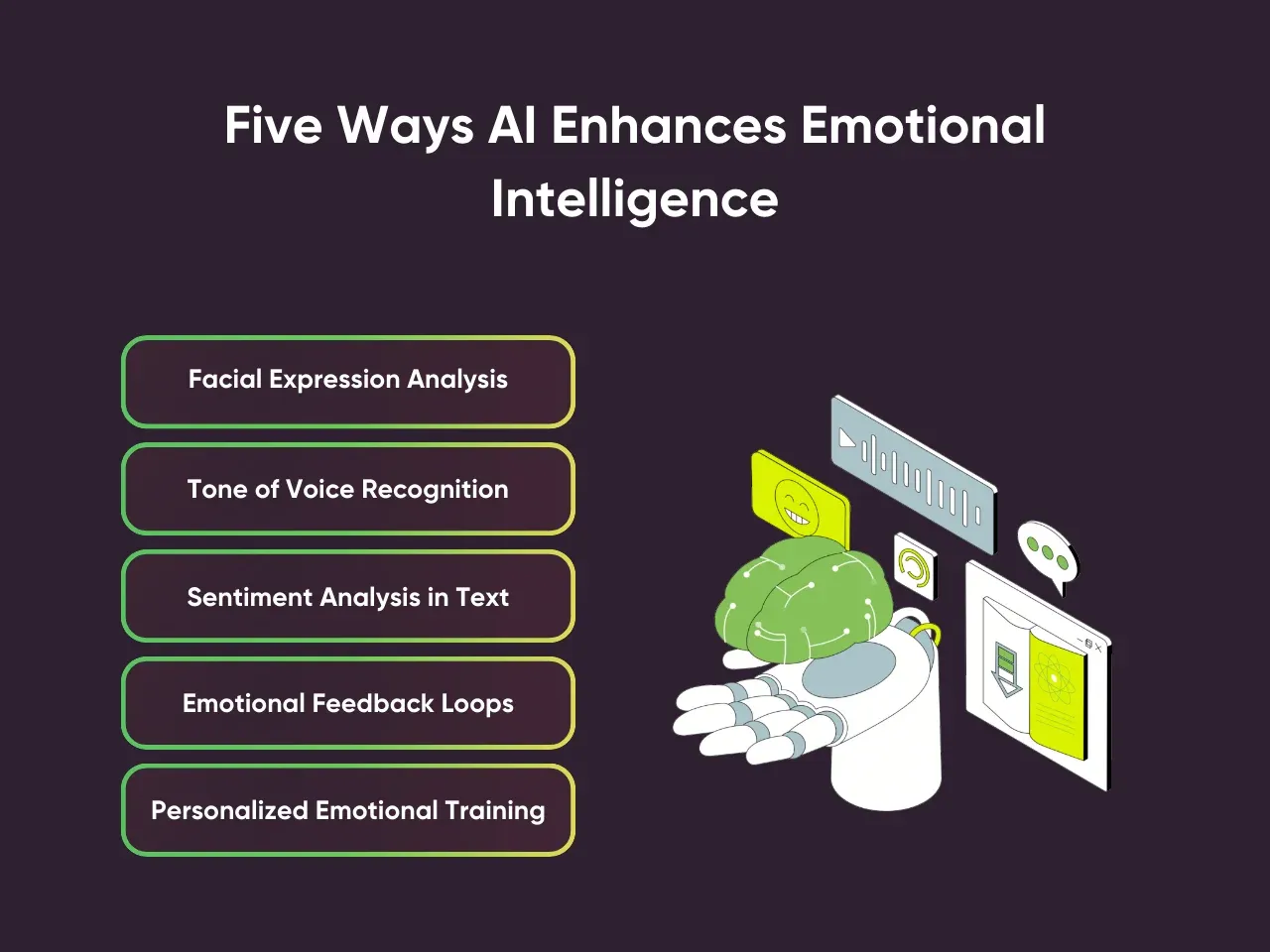
- Facial Expression Analysis: AI can detect and interpret facial expressions, offering insights into emotional states during conversations.
- Tone of Voice Recognition: AI assesses vocal tones, identifying stress, excitement, or sadness in speech.
- Sentiment Analysis in Text: AI tools analyze written communication to highlight emotions conveyed in emails, messages, and social media.
- Emotional Feedback Loops: AI tracks mood patterns over time, helping individuals recognize emotional triggers.
- Personalized Emotional Training: AI offers tailored exercises to improve emotional intelligence through simulations and feedback.
AI tools help people recognize and manage emotions more effectively. Consistently analyzing emotional cues can improve their empathy, self-awareness, and relationship-building skills. This is why embracing AI’s role in emotional intelligence equips professionals and individuals with tools to navigate personal and professional settings successfully.
2. Improve Empathy
An AI companion enhances empathy by tracking emotional cues such as facial expressions, tone, and language. It offers real-time feedback, helping individuals recognize the emotions of others more accurately. This awareness allows for more compassionate responses, strengthening relationships. AI also simulates emotional scenarios, allowing users to practice empathy in diverse situations.
On top of that, AI companions refine emotional recognition, making it easier to understand different perspectives. As a result, users develop deeper connections and more effective communication in personal and professional interactions, leading to improved emotional intelligence and more meaningful relationships.
3. Provide Feedback on Communication
Providing feedback on communication is another way an AI companion helps improve emotional intelligence. They do this by analyzing conversations for tone, word choice, and emotional balance. They also offer suggestions to improve clarity and engagement. For example, if a message sounds harsh, the AI flags it, helping users adjust their approach for more empathy.
This feedback helps users develop better communication habits over time. With consistent guidance, AI companions promote the growth of emotional intelligence. As users refine their skills, they become better at nurturing trust, collaboration, and understanding in their interactions. With this, it fosters stronger personal and professional relationships.
4. Reminders for Emotional Check-ins
Regular emotional check-ins are essential for maintaining emotional well-being. They help individuals stay connected with their feelings, fostering greater emotional awareness. AI companions can provide timely reminders for emotional check-ins, encouraging users to reflect on their mood and mental state. This process enhances emotional intelligence by promoting self-awareness and emotional regulation.
Here are the top five ways AI companions can assist with emotional check-ins:
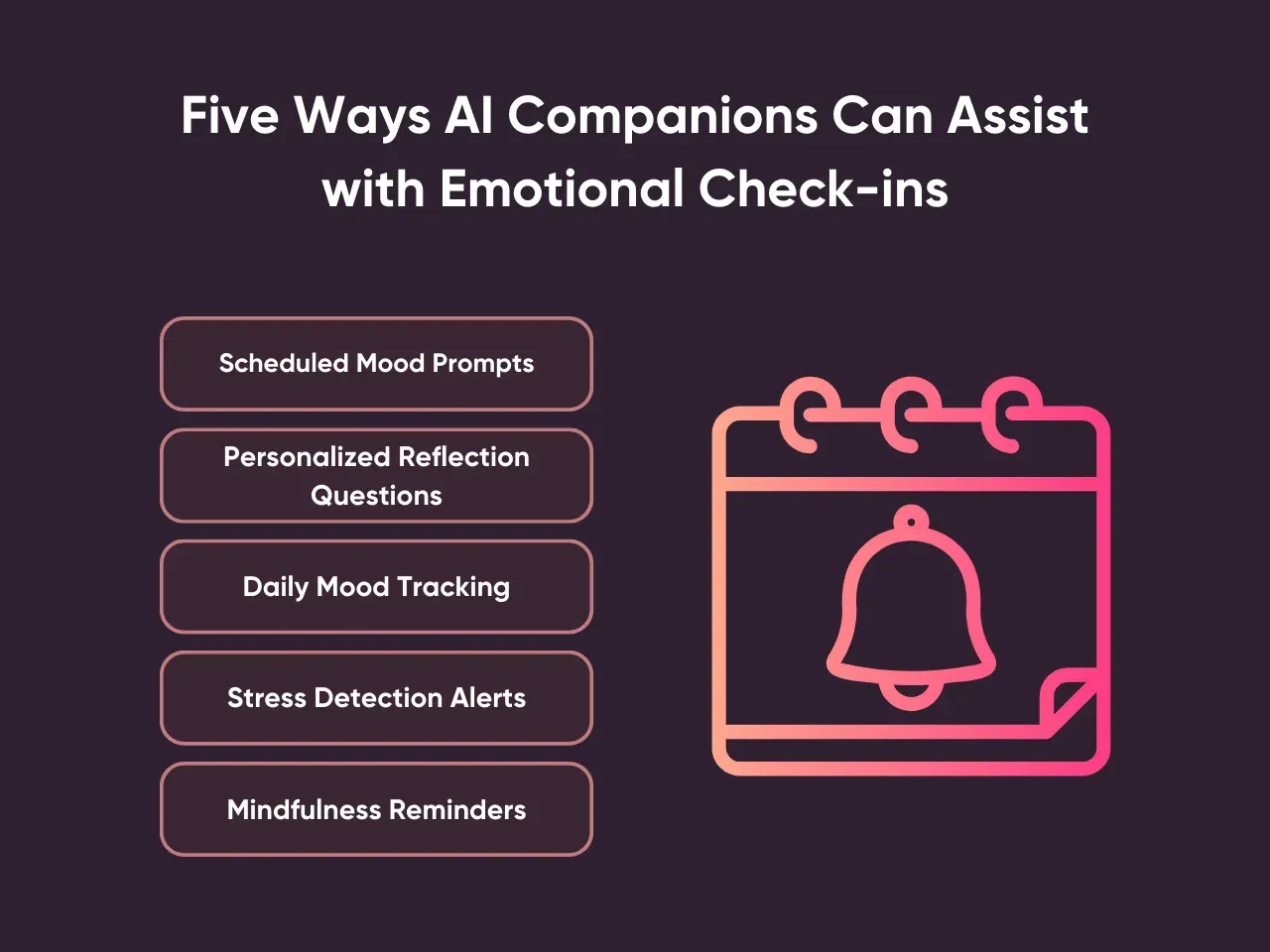
- Scheduled Mood Prompts: AI companions can send reminders to check in with your emotions at specific times during the day.
- Personalized Reflection Questions: AI offers customized questions that encourage deep reflection on emotional experiences.
- Daily Mood Tracking: AI companions help users track their emotional state through quick, daily mood logs.
- Stress Detection Alerts: AI can detect signs of stress and suggest an emotional check-in when stress levels rise.
- Mindfulness Reminders: AI companions prompt users to practice mindfulness, promoting emotional awareness and relaxation.
AI companions consistently make emotional check-ins, offering valuable feedback to improve emotional awareness. By doing this, users develop stronger emotional intelligence with regular prompts and reflections, positively impacting relationships, decision-making, and overall mental well-being.
5. Encourage Self-Reflection
Self-reflection is a critical aspect of emotional intelligence. It allows individuals to analyze their thoughts, actions, and emotional responses to different situations. An AI companion can support this process by prompting reflective questions and offering insights based on past behaviors. This helps individuals gain clarity and develop emotional awareness over time.
These are the five ways an AI companion encourages self-reflection:
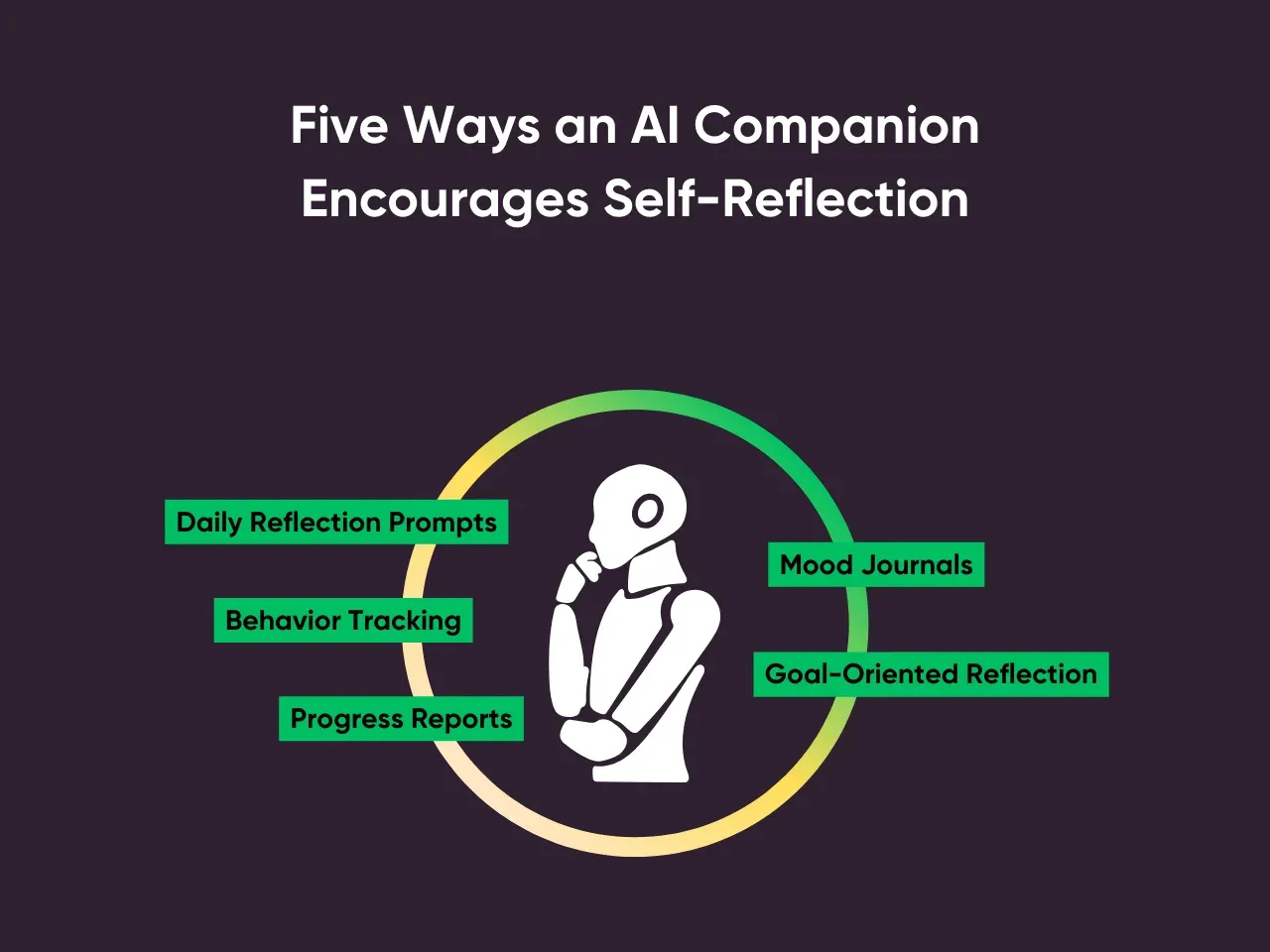
- Daily Reflection Prompts: The AI companion suggests questions to review daily experiences, fostering personal growth and emotional understanding.
- Behavior Tracking: The AI monitors emotional patterns and behaviors, encouraging users to reflect on their reactions.
- Progress Reports: AI generates periodic reports on emotional trends, allowing users to review and improve their responses.
- Mood Journals: The AI companion helps users maintain a digital journal, making it easier to track emotions and identify triggers.
- Goal-Oriented Reflection: AI sets emotional goals and prompts users to evaluate their progress regularly, fostering a proactive approach to emotional development.
An AI companion promotes consistent self-reflection, which is essential for cultivating emotional intelligence. With its support, individuals can deepen their understanding of emotions, adjust their behaviors, and enhance personal growth in both personal and professional areas.
Personal Growth and Self-Reflection in Relationships with AI
Relationship AI plays a transformative role in helping individuals reflect on their behavior and its effects on their relationships. Personalized insights and feedback encourage self-awareness, helping users understand their patterns and how to improve communication, patience, and affection with their partners.
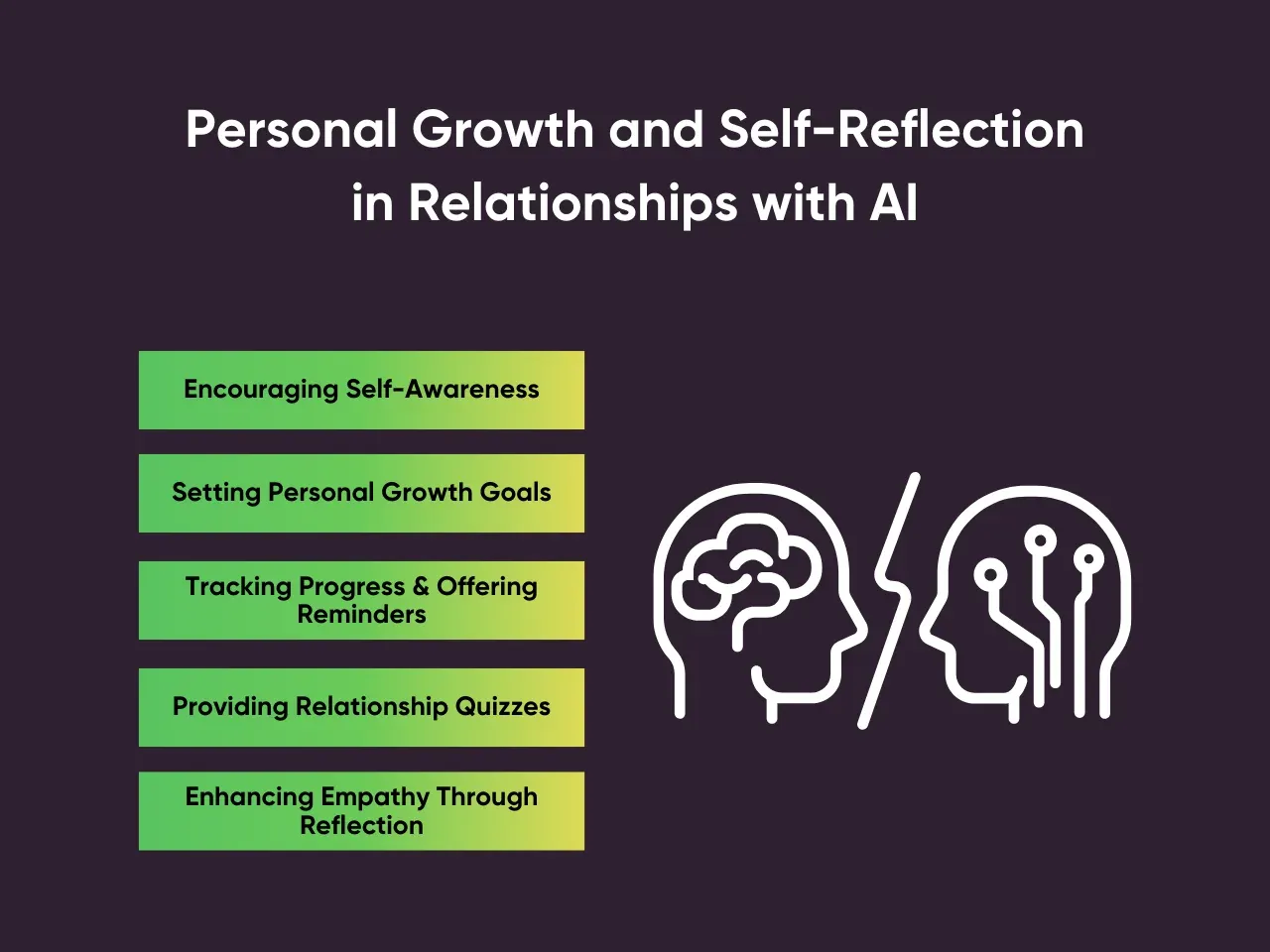
1. Encouraging Self-Awareness
An AI companion encourages self-awareness through constant feedback. It helps individuals identify how their actions and communication patterns affect their partner. This awareness allows users to recognize areas for improvement, whether in their tone, responses, or emotional availability. It allows partners to adjust behaviors that may negatively affect their relationship.
2. Setting Personal Growth Goals
Relationship AI is vital in setting personal growth goals tailored to each individual's needs. These goals focus on improving listening skills, being more patient, or expressing emotions more effectively. AI-generated goals are specific and measurable, allowing users to focus on tangible improvements to strengthen their relationships.
3. Tracking Progress and Offering Reminders
Consistency is crucial for personal growth. Relationship AI helps with this by providing reminders and progress-tracking tools to keep individuals on track with their relationship goals. AI sends reminders to check in with their partner, express gratitude, or reflect on their personal growth. Having progress tracking ensures that individuals can see their improvements, which motivates them to stay committed to positive changes.
4. Providing Relationship Quizzes
Quizzes and assessments offered by relationship AI help partners identify strengths and areas needing improvement. These quizzes evaluate communication styles, emotional responses, and problem-solving approaches, giving couples a clear understanding of their dynamics. The insights from these quizzes can guide partners toward focusing on areas like affection or patience.
5. Enhancing Empathy Through Reflection
Relationship AI encourages reflection, which naturally enhances empathy between partners. AI prompts individuals to reflect on how their actions impact their partner’s feelings and overall well-being. This regular reflection helps foster a deeper understanding of their partner’s emotional needs, leading to more thoughtful and compassionate interactions. As a result, both partners benefit from an increased sense of empathy in their relationship.
AI companion takes a structured and personalized approach to personal growth and self-reflection. Encouraging self-awareness, setting growth goals, offering progress tracking, and fostering empathy, AI tools guide individuals toward becoming better partners.
Key Takeaway
Relationship AI offers innovative ways to strengthen relationships through improved communication and emotional intelligence. These tools help partners understand each other better, fostering more profound connections. Relationship AI encourages self-reflection, allowing individuals to identify areas for personal growth. With these benefits, users can have honest and meaningful conversations with features like unfiltered AI chat, leading to stronger emotional bonds.
AI tools act as supportive companions that help individuals and couples navigate challenges. While they provide insights into communication and emotional cues, it's important to maintain a balance between relying on AI and nurturing real human connections. Training AI chatbots to recognize emotional needs can aid in building healthier relationships, but they should complement, not replace human effort.
Are you ready to explore how relationship AI can transform your partnership? At Kindroid, we help you build personalized AI companions to enhance your connection. Create your own AI relationship assistant today and experience deeper emotional growth with your partner.
